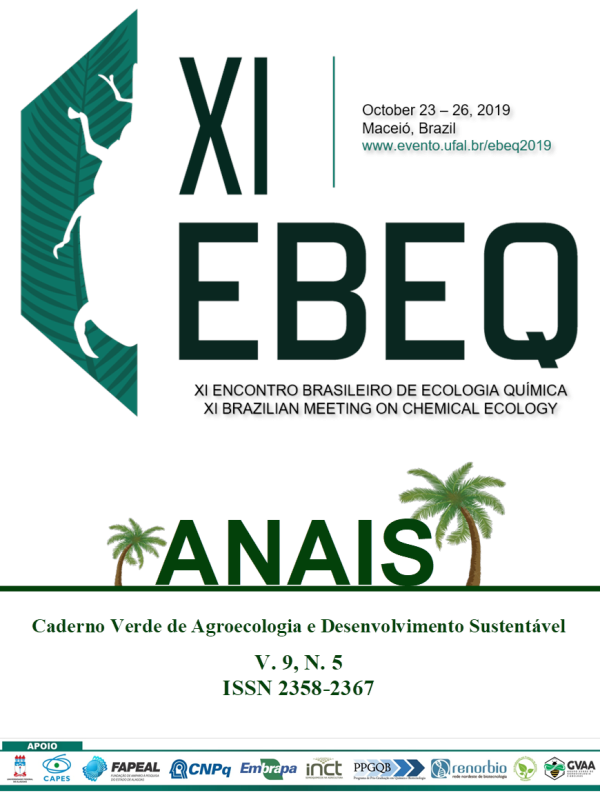LARVICIDAL ACTIVITY OF ESSENTIAL OILS FROM Nymphaea lotus LEAVES AGAINST Aedes aegypti MOSQUITO
Keywords:
AEDES AEGYPTI, LARVICIDAL ACTIVITY, NYMPHAEA LOTUS, ESSENTIAL OIL.Abstract
The Aedes aegypti mosquito concerns global health agencies because the vector is responsible for transmitting the diseases Zika, Dengue, Chikungunya and Yellow Fever. One of the alternatives to prevent these diseases is to control the mosquito vector population. The use of plant-derived extracts and essential oils has been driven by their being biodegradable, generally having no negative effects on non-target organisms and having different modes of action. Essential oils and extracts from Nymphaea spp. (aff. N. caerulea and N. lotus) are known for their use in oriental medicinal practices, especially in India and China. Thus, the objective of this work was to identify the chemical composition of the essential oil of Nymphaea lotus Roxb leaves. ex Andrews and evaluate their larvicidal activity against the A. aegypti mosquito. Plant material was collected in Olinda, at Abolição Square (8 ° 1'4 ”S 34 ° 51'1” W) in Pernambuco. Extraction of the essential oil was performed for 3 hours by hydrodistillation technique. The yield obtained for the essential oil of dehydrated N. lotus leaves was 0.05% (58.8mg). The identification of the essential oil was performed by the mass spectrometry coupled with gas chromatography (GC-MS) technique and it was found that the major constituents were hexadecanoic acid, dolabella-3,7,18-triene and (Z,Z,Z)-9,12,15-octadecatrienoic acid. The essential oil and aqueous extract of N. lotus leaves showed larvicidal activity against the A. aegypti mosquito. The preliminary test result for the essential oil was 100% mortality at 50ppm concentration and for the concentrated aqueous extract it was 70% mortality. Both showed potential as an alternative to combat the spread of the mosquito and consequently the diseases transmitted by it.Downloads
Published
How to Cite
Issue
Section
License
Termo de cessão de direitos autorias
Esta é uma revista de acesso livre, em que, utiliza o termo de cessão seguindo a lei nº 9.610/1998, que altera, atualiza e consolida a legislação sobre direitos autorais no Brasil.
O(s) autor(es) doravante designado(s) CEDENTE, por meio desta, publica a OBRA no Caderno Verde de Agroecologia e Desenvolvimento Sustentável, representada pelo Grupo Verde de Agroecologia e Abelhas (GVAA), estabelecida na Rua Vicente Alves da Silva, 101, Bairro Petrópolis, Cidade de Pombal, Paraíba, Brasil. Caixa Postal 54 CEP 58840-000 doravante designada CESSIONÁRIA, nas condições descritas a seguir:
O CEDENTE declara que é (são) autor(es) e titular(es) da propriedade dos direitos autorais da OBRA submetida.
O CEDENTE declara que a OBRA não infringe direitos autorais e/ou outros direitos de propriedade de terceiros, que a divulgação de imagens (caso as mesmas existam) foi autorizada e que assume integral responsabilidade moral e/ou patrimonial, pelo seu conteúdo, perante terceiros.
O CEDENTE mantêm os direitos autorais e concedem à revista o direito de divulgação da OBRA, com o trabalho simultaneamente licenciado sob a Licença Creative Commons do tipo atribuição CC-BY.
O CEDENTE têm autorização para distribuição não-exclusiva da versão do trabalho publicada nesta revista.
O CEDENTE têm permissão e são estimulados a publicar e distribuir seu trabalho online (ex.: em repositórios institucionais ou na sua página pessoal) a qualquer ponto antes ou durante o processo editorial, já que isso pode gerar alterações produtivas, bem como aumentar o impacto e a citação do trabalho publicado.








